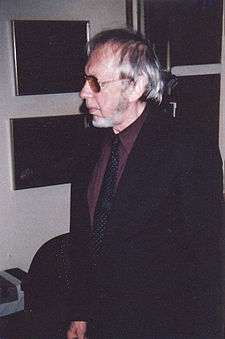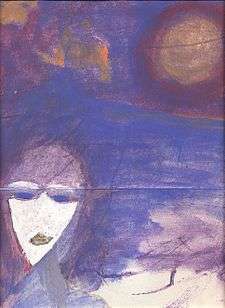Svetozar Vlajković
| Svetozar Vlajković Светозар Влајковић | |
|---|---|
 | |
| Born |
5 January 1938 Čubura, Belgrade, Serbia |
| Occupation | Writer |
| Language | Serbian |
| Nationality | Serbian |
Svetozar Vlajković (Serbian Cyrillic: Светозар Влајковић, pronounced [sʋeːtozar ʋlajkoʋitɕ]), born in a Belgrade slum area called Čubura on 5 January 1938, is a Serbian writer.
Biography
Svetozar Vlajković spent his childhood years in house arrest – his hometown was occupied by the Germans. He did not learn much at elementary school, high school and university. Therefore, he had to educate himself and focused on studying philosophy, psychology, literature and art history as much as he could.
Svetozar graduated from the Faculty of Law at Belgrade University although his desire was to become a medical doctor. Nevertheless, he would find out later that his books had healing power on some people, so his long-standing wish was fulfilled in a way.
Life in Čubura brought him a fair share of bad experiences with people, so he escaped into romanticism.
Thanks to playing jazz on his guitar at dances he scraped by to buy cigarettes, but he was immersing progressively into imaginary worlds in order to bear this so-called real one.
He married very young, out of love. However, he got divorced as a middle-aged man, also out of love – towards truth. His daughter from this marriage taught him how to be a child, so he started writing radio plays for children.
Whenever he had a chance, he starred or played support roles in films in order to enhance his tolerance towards nonsense of this world.
At the age of 44, Svetozar Vlajković met his father who was being kept at distance from him for reasons known only to mothers from this part of the world. His father was a writer, and that is the worst possible recommendation for being welcomed into a society of the mediocre and illiterate such as were the residents of Čubura.
He worked as a court reporter for the daily newspaper Borba. There he realized that he was not living in a law-abiding society, that theory taught at university and judicial practice are two different things.
He came to despise daily journalism, so he found a post in the Art Department of Radio Beograd. Before Third Programme was launched in 1964, he had been invited to do radio shows on philosophy and sciences. After 6 years, he was demoted to write jingles for a noodle factory because his views were ideologically unsound for the theoretical level of thinking.
In 1971, Svetozar got a scholarship to study theatre researches at Sorbonne in Paris. Antoine Vitez appointed him his assistant at the Théâtre des Quartiers d'Ivry. But, Svetozar was more interested in Parisian life he would describe in several of his novels years later.
A year later, Radio Beograd invited him to edit talk shows at the local radio station 202. He was working there until his retirement, in spite of numerous conflicts with the staff members who were refusing to apply new tendencies and ideas in the domain of radio.
In 1979, he remarried, out of love again, and got divorced after a decade, also out of love – towards truth. The birth of his son brought him experience of fatherhood in which that holly relationship Father-Son transposes.
When Svetozar realised that there came time in the man's life not to be involved in the public life any longer, he abandoned official literary circles, distanced himself from the world of media and dedicated himself to gaining his inner peace.
Since 1992 he has been living with the woman whose character he depicted in his novel Nensoleta dela Luna. There is no proper marriage without a church wedding, Svetozar concluded one day. Therefore, he got married in St. Archangel Michael's Church in Herceg Novi and the couple settled down in Svetozar's birth house. Someone made a remark that he was the only writer from his generation in Serbia who was living in the same house where he had been born.
In the meantime, he wrote twenty-five books of fiction and fifty plays of all forms and genres.
When he looked around one day, he noticed that the walls of his rooms were covered with his paintings on canvas and concluded that he had been painting since the very day he started writing books and plays.
Works
Fiction
.jpg)
.jpg)
At the beginning, his novels and stories were overflowing with poetic fantasy. The literary critics from that period, who commended his novels, reproached him excess imagination. This writer saw this comment as a compliment. Even then, in his opinion, writing was like dreaming while being awake.[1]
- Šta bi učinio Zobec (What Zobec Would Do), short story,1969
- Šuma čudnovata (The Wonderwoods), novel, 1969
- Neko drugo leto (Some Other Summer), novel, 1971
- Čubura, negde u Kaliforniji (Čubura, Somewhere in California), novel, 1976
- Večernji trkači (The Evening Chasers), roman, 1980
- The novel Vera, 1981, is the first work in a series of novels with confessional tone where the author follows his conviction that a writer and his work are one and the same:
- Pokretne stepenice (Moving steps), novel, 1986
- Ružičasti arhipelag (Pink Archipelago), novel, 1991
- Najslabiji učenik škole igranja (The Worst Disciple In A Dancing School), novel, 1992
- Karamfla, novel, 1998[2]
- Imenik (The Phone Book), novel, 1998
- Skladište uzdaha (A Storeroom of Sighs), novel, 1998
- Tajanstvo spajanja (The Mystery of Reunion), novel, 2000.[3]
Svetozar continues as a storyteller to shows his affinity towards the fantastic which results in the following stories:
- Uzletanje (Taking Off), short story, 1997
- Rajska ptica (Bird of Paradise), short story, 2005[4]
Since there was no one to interpret his literary works in an adequate way, Svetozar wrote two books of essayistic autobiographies which represent a sort of apocryphal history of Serbian literature in the second half of the twentieth century. These books were released by Svetozar's first publisher Prosveta, i.e. a publishing house which will be closed down soon.
- Don Žuan beogradski u šumi čudnovatoj (Don Juan From Belgrade in the Wonderwoods), 2005[5]
- Pustinja u prašumi (A Desert in the Jungle), 2008.[6]

Just before Nolita was to be closed down, this publishing house had released the following books:
- Smirenje na jezeru Leko (Repose At The Lake of Lecco), novel, 2008
- Duga na sajmu knjiga (The Rainbow at the Book Fair), short story, 2009.[7]
Rad, one of the most renowned publishing houses once, had released before being closed down:
- Neznani vojnik (An Unknown Soldier), novel, 2008, a new and final version of the novel Karamfla.
The aforementioned books placed Svetozar Vlajković among the writers who react against current socio-historic events.
Nevertheless, he wrote a poetic-fantasy novel in order to create a counterbalance.
- Sanja (Sanya), 2006, where this author uses one of the subjects from the beginning of his literary journey: how to become an elf.
- The novel Stranac (The Stranger) was released at the end of 2012. Christian spirit, which has become more patent in several previous works, gains its manifest expression in this novel. Pondering over how being estranged is a natural feeling of religious people, the writer focuses on self-awareness which separates a new man from the old one in one and the same personality.
Theatre
Three plays by Svetozar Vlajković have been put on stage:
- Grejalica (The Heater), Atelje 212 Theatre, 1969
- Stvari u vrtu (Objects in the Garden), Theatre Levo, 1970
- Rastanak (Breakup), Beogradsko dramsko pozorište (Belgrade Drama Theatre), 1978.
The writer focuses on integrity of a human being, a search for the ideal woman that does not exist and growing up.
Three plays have been broadcast by TV Belgrade Drama Programme:
- Džangrizalo (A Nagger), comedy
- Džek pot (Jack pot), family drama
- Zasluge (Merits), based on a novel by Aleksandar Vučo.
The following theatre plays have been published in several magazines specialised in theatre:
- Zidanje (Construction Works), Scena (Stage), 1977
- Večernji trkači (The Evening Chasers), Scena (Stage), 1983
- Don Žuan beogradski (Don Juan of Belgrade), Scena (Stage), 1986[8]
- Ponavljač (A Failure), Scena (Stage), 1991
- Marko&Musa, Savremena srpska drama (Modern Serbian Drama), 2006
- More u liftu (A Sea in the Elevator), Savremena srpska drama (Modern Serbian Drama), 2008
- I nevidljivi voli vatromet (The Invisible Like Fireworks Too), Savremena srpska drama (Modern Serbian Drama), 2011.
Svetozar Vlajković has had dozens of his plays broadcast on television and radio. He dedicated a special attention to radio plays for and about children and was awarded a dozen of awards at various public anonymous contests for radio plays. Radio Beograd acknowledged his contribution to radio in 2005. The theatre play Zidanje (Construction Works) brought him the first prize at public contests organised by three theatres (the Yugoslav Drama Theatre in Belgrade, the National Theatre in Novi Sad and the Serbian National Theatre in Niš).
Film
Four films have been made based on original screenplays by Svetozar Vlajković:
- Prvo ubistvo (The First Murder), 1970
- Bez (Without), 1972
- Kvar (Breakdown), 1979
- Čavka (Jackdaw), 1982[9]
Svetozar played roles in films by Dejan Djurković and Miša Radivojević. He had a special appearance in a TV series by Živojin Pavlović "Pesma“ (The Poem).
He also wrote a dozen of essays on the Serbian writers and artists he was close to (Ljubiša Jocić, Bata Mihajlović, Ljubinka Jovanović, Aleksandar Tišma, Dušan Matić and others).
The most precious acknowledgements for his literary and artistic works come from numerous anonymous readers who write to him.
External links
- Svetozar Vlajković official website
- Svetozar Vlajković: Unholy holy and other stories of archimandrite tikhon
- Svetozar Vlajković: IMDB
- Svetozar Vlajković: IMDB
- Svetozar Vlajković: Actor and absolute (magazine "Kultura" No. 5/6 year of publication: 1969).